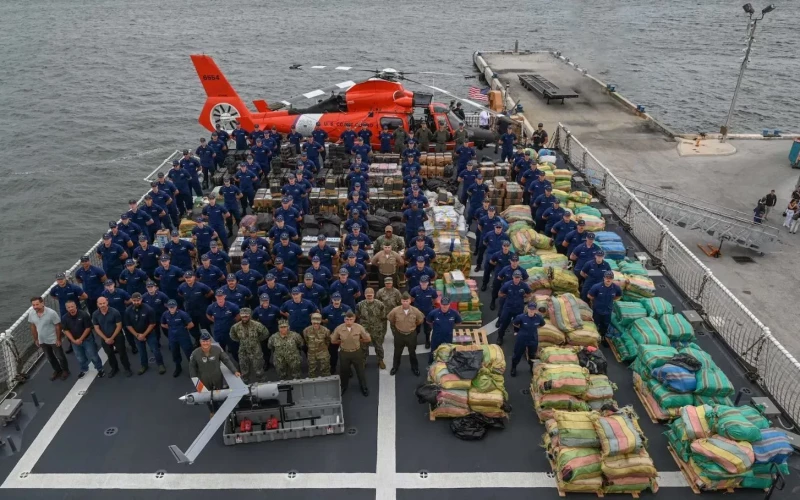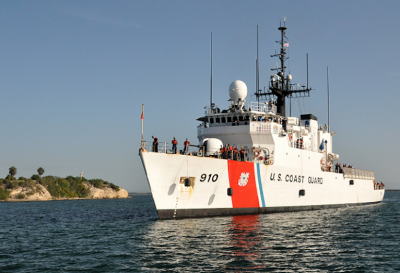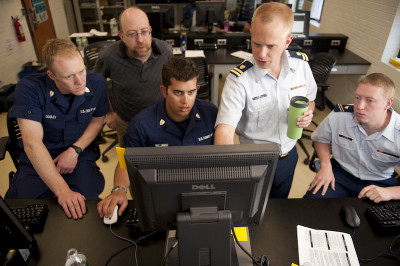The crew of U.S. Coast Guard Cutter James offloaded more than 33,200 lbs. of cocaine and 12,400 lbs. of marijuana worth approximately $448 million in Port Everglades last Thursday.
The offloaded drugs were interdicted during 13 separate cases in the international waters of the Eastern Pacific Ocean and Caribbean Sea due to the combined efforts of:
• U.S. Coast Guard Cutter James (WMSL 754)
• U.S. Coast Guard Cutter Thetis (WMEC 910)
• U.S. Coast Guard Cutter Vigilant (WMEC 617)
• U.S. Coast Guard Cutter Valiant (WMEC 621)
• U.S. Coast Guard Pacific Tactical Law Enforcement Team
• USS Farragut (DDG 99)
• Helicopter Interdiction Tactical Squadron
• U.S. Customs and Border Protection, Air and Marine Operations (AMO) aircrews
• Joint Interagency Task Force South
“This offload is about national security,” Vice Adm. Kevin Lunday, commander U.S. Coast Guard Atlantic area, said in a statement announcing the interdictions. “It represents one part of a very large and strong interagency team that works closely with our allies and international partners to interdict maritime smuggling of dangerous and illegal drugs into the United States.”
Numerous U.S. agencies from the departments of Defense, Justice and Homeland Security cooperated in the effort to combat transnational organized crime. The Coast Guard, Navy, Customs and Border Protection, Federal Bureau of Investigation, Drug Enforcement Administration, and Immigration and Customs Enforcement, along with allied militaries and international partner agencies, play a role in counter-drug operations.
"Our success hinges on our people. For the past 113 days, the women and men of James worked around the clock in support of the counter-narcotics mission," said Capt. Donald Terkanian, commanding officer of James. “That being said, we cannot do this mission alone. We appreciate the immense support and dedication from our interagency and international partners that join us here today.”
The fight against drug cartels in the Eastern Pacific Ocean and the Caribbean Sea requires a unity of effort in all phases, from detection and monitoring to interdiction and apprehension, through criminal prosecutions by international partners and U.S. Attorneys’ Offices in districts across the nation. The Joint Interagency Task Force South in Key West, Fla., conducts the detection and monitoring of aerial and maritime transit of illegal drugs. The law enforcement phase of counter-smuggling operations in the Eastern Pacific Ocean is conducted under the authority of the Coast Guard 11th District, headquartered in Alameda, Calif., and the law enforcement phase of operations in the Caribbean is conducted under the authority of the Coast Guard 7th District, headquartered in Miami. The interdictions, including the actual boardings, are led and conducted by members of the U.S. Coast Guard.
These interdictions relate to Organized Crime Drug Enforcement Task Forces (OCDETF) designated investigations. OCDETF identifies, disrupts, and dismantles the highest-level criminal organizations that threaten the U.S. using a prosecutor-led, intelligence-driven, multi-agency approach. Additional information about the OCDETF program can be found here.
James falls under the command of U.S. Coast Guard Atlantic Area. Based in Portsmouth, Va., U.S. Coast Guard Atlantic Area oversees all Coast Guard operations east of the Rocky Mountains to the Arabian Gulf. In addition to surge operations, Atlantic Area also allocates ships to deploy to the Caribbean and Eastern Pacific to combat transnational organized crime and illicit maritime activity.





